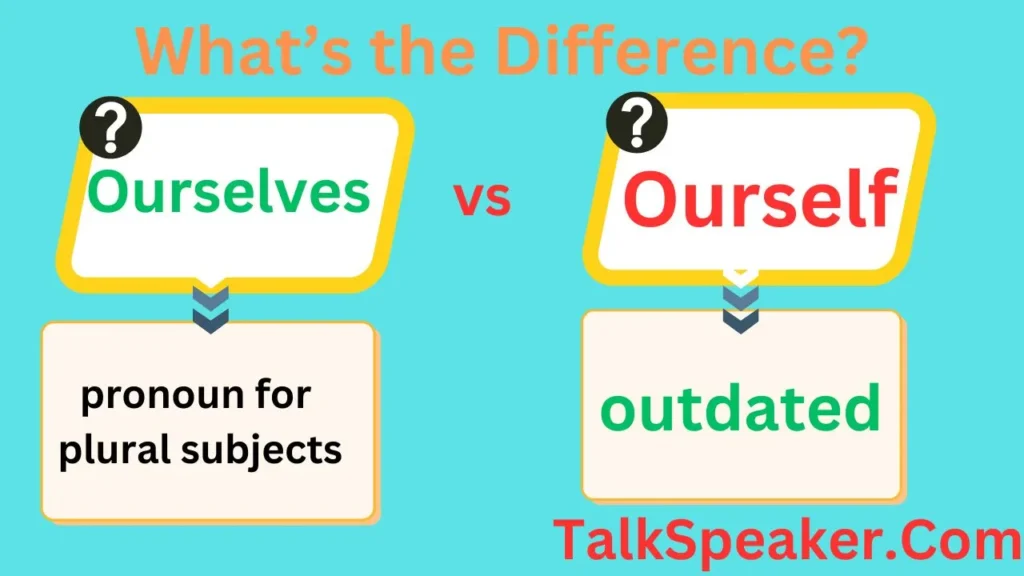Last updated on November 21st, 2024 at 06:30 am
Pronouns like “ourselves” and “ourself” can seem straightforward, yet their proper usage is often misunderstood. These reflexive pronouns have distinct applications rooted in grammar rules and historical context.
While “ourselves” is widely used in modern English, “ourself” has largely faded, except in specific historical or stylistic contexts.
Ourselves’ is the correct reflexive pronoun for plural subjects, while ‘ourself’ is outdated and rarely used.
In this guide, we’ll explore the nuances between “ourselves” and “ourself” to help you master these pronouns and avoid common mistakes in both writing and speech.

Learn the clear difference between “ourselves” and “ourself” with this detailed guide. Get insights into correct usage, historical context, and practical tips to ensure clarity and accuracy.
The Basic Difference Between Ourselves and Ourself
At the heart of understanding these pronouns is recognizing their basic definitions and correct usage:
- Ourselves:
This is a reflexive pronoun used with plural subjects. For example, “We enjoyed ourselves at the party.” It emphasizes that the action of the verb is performed by the subject on itself. - Ourself:
This term is less common and considered non-standard in modern English. Historically, it was used with singular subjects, but this usage has largely fallen out of favor. In contemporary grammar, “ourself” is often seen in specific or archaic contexts, rather than everyday language.
Grammar Rule
- “Ourselves” should be used when the subject is plural, such as “we” or “us.” For example, “We treated ourselves to a day off.”
- “Ourself” might appear in older texts or specialized contexts but is generally incorrect in modern usage.
Basic Usage Rules and Examples of “Ourselves Or Ourself”
| Pronoun | Usage | Example Sentence | Context |
|---|---|---|---|
| Ourselves | Plural reflexive pronoun; used with “we” or “us” | “We treated ourselves to a nice dinner.” | Common and standard in modern English |
| Ourself | Singular reflexive pronoun; historically used with “we” | “The king reflected upon ourself.” | Non-standard today; used in historical or stylistic contexts |
Usage of ‘Ourselves’ and ‘Ourself’ in Historical Texts
Examining historical texts provides insight into how these pronouns were used in the past:
- Historical Examples:
In classic literature and historical documents, “ourself” appears in various contexts. For instance, Shakespeare’s works include instances of “ourself,” reflecting the language norms of his time. - Modern Transition:
As language evolved, “ourselves” became the accepted form for plural reflexive pronouns. This shift is evident in contemporary texts, where “ourself” is rarely used.
Reflecting Authority: The Royal and Editorial We
The royal and editorial uses of “we” reflect a historical and stylistic approach to pronoun usage:
- The Royal We:
Monarchs and leaders used this form to convey a sense of grandeur and collective identity. For example, “We are pleased to announce…” - Editorial We:
In academic and professional writing, the editorial we is used to present information with authority and inclusiveness. For instance, “We believe that further research is needed…”
These usages influence how pronouns like “ourselves” and “ourself” are perceived and used in formal and historical contexts.
Key Differences Between “Ourselves” and “Ourself” in Modern and Historical Contexts
| Aspect | Ourselves | Ourself |
|---|---|---|
| Usage Frequency | Common in contemporary English | Rare and largely outdated |
| Primary Usage Context | Used in daily speech and writing | Historical texts, royal or editorial uses |
| Examples in Literature | Seen in most modern literature | Seen in works like those of Shakespeare |
| Associated Grammar Rule | Plural reflexive pronoun | Singular reflexive pronoun, typically avoided today |
| Memory Tip | Use with “we” or “us” | Used for a singular subject in older, royal contexts |
When ‘Ourself’ Makes Sense: Special Contexts and Exceptions
While “ourself” is largely non-standard, it does appear in specific contexts:
- Non-standard Usage:
“Ourself” might be used for stylistic or archaic reasons. For example, some modern writers or poets might use “ourself” to evoke a historical or formal tone. - Contextual Relevance:
In certain contexts, like historical fiction or classical literature, “ourself” may be employed to maintain authenticity. - Examples and Clarifications:
- In a historical novel: “The king reflected upon ourself in solitude.”
- In a stylistic choice: “Let us engage with ourself deeply.”
Examples of ‘Ourselves’ and ‘Ourself’ in Literature
Literature provides valuable examples of both pronouns:
- Literary References:
- “Ourselves”: Modern novels and works use “ourselves” as the reflexive pronoun, reflecting current usage norms.
- “Ourself”: Classic literature, such as Shakespeare’s plays, may feature “ourself” to capture historical language styles.
- Analysis:
In literature, the choice between “ourselves” and “ourself” often serves to align with the historical period or stylistic approach of the text. - Influence on Language:
Literary usage of these pronouns influences modern understanding and application, providing context for their evolution.
Common Misconceptions and Grammar Myths Debunked
Several misconceptions surround the use of “ourselves” and “ourself.”
Here are some clarifications:
- Myth vs. Fact:
- Myth: “Ourself” is acceptable in modern standard English.
- Fact: “Ourself” is considered non-standard and should be avoided in contemporary writing.
- Grammar Myths:
- Myth: “Ourself” is a valid alternative to “ourselves” in any context.
- Fact: “Ourselves” is the correct form for plural reflexive pronouns, while “ourself” is outdated and rarely used.
- Clarification: Ensuring the correct usage of “ourselves” helps maintain clarity and grammatical accuracy in writing.
Practical Tips to Ensure Correct Pronoun Usage
To avoid confusion and ensure correct pronoun usage, follow these practical tips:
- Memory Aids:
Remember that “ourselves” is the standard plural reflexive pronoun. Use “ourself” only in specific, stylistic contexts. - Proofreading Strategies:
- Read Aloud: Hearing your writing can help identify incorrect pronoun usage.
- Check Context: Ensure pronouns match the number and person of the subject.
- Tools and Resources:
- Grammar Checkers: Use tools like Grammarly or ProWritingAid to catch errors.
- Style Guides: Refer to authoritative style guides for further guidance.
Strategies to Remember the Difference
To master the usage of “ourselves” and “ourself,” employ these strategies:
- Mnemonic Devices: Think of “ourselves” as the plural form, used with “we” and “us.” Associate “ourself” with historical or stylistic contexts.
- Practice Exercises:
- Create sentences using both “ourselves” and “ourself” to reinforce understanding.
- Review and correct sentences from various texts to identify correct usage.
- Interactive Learning: Engage in exercises and quizzes to test your knowledge and improve retention.
Common Situations and How to Approach Them
Understanding how to apply these pronouns in different situations can help ensure correct usage:
- Everyday Scenarios:
- Correct: “We enjoyed ourselves at the park.”
- Incorrect: “We enjoyed ourself at the park.”
- Practical Application: Apply the standard rules of using “ourselves” with plural subjects and avoid “ourself” in modern contexts.
- Examples and Solutions:
- In Writing: Ensure consistency by using “ourselves” when referring to plural subjects.
- In Speech: Practice using “ourselves” correctly to reinforce its proper usage.
What People Ask:
What is the difference between “ourselves” and “ourself”?
“Ourselves” is used as a plural reflexive pronoun, while “ourself” is historically singular and considered non-standard today.
When should I use “ourselves” in a sentence?
Use “ourselves” when the subject is plural, like “we” or “us.” For example, “We enjoyed ourselves at the event.”
Is “ourself” grammatically correct in modern English?
“Ourself” is largely non-standard today and is rarely used outside of historical or stylistic contexts.
Why was “ourself” used historically?
“Ourself” was often used with the “royal we,” where monarchs or officials referred to themselves in the plural.
Can I use “ourself” in formal writing?
In modern formal writing, “ourselves” is the preferred form. “Ourself” may only be used if creating an archaic or historical tone.
Conclusion
Understanding the differences between “ourselves” and “ourself” is crucial for effective and accurate communication. By grasping the historical context, modern usage, and practical applications, you can confidently use these pronouns in your writing.
Remember to practice regularly, use available tools, and refer to authoritative resources to maintain grammatical precision.

Amelia Harris, a passionate educator, simplifies English grammar and vocabulary for learners of all levels. With her engaging style, mastering English has never been easie




